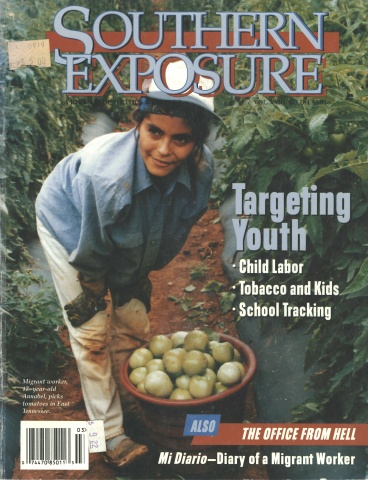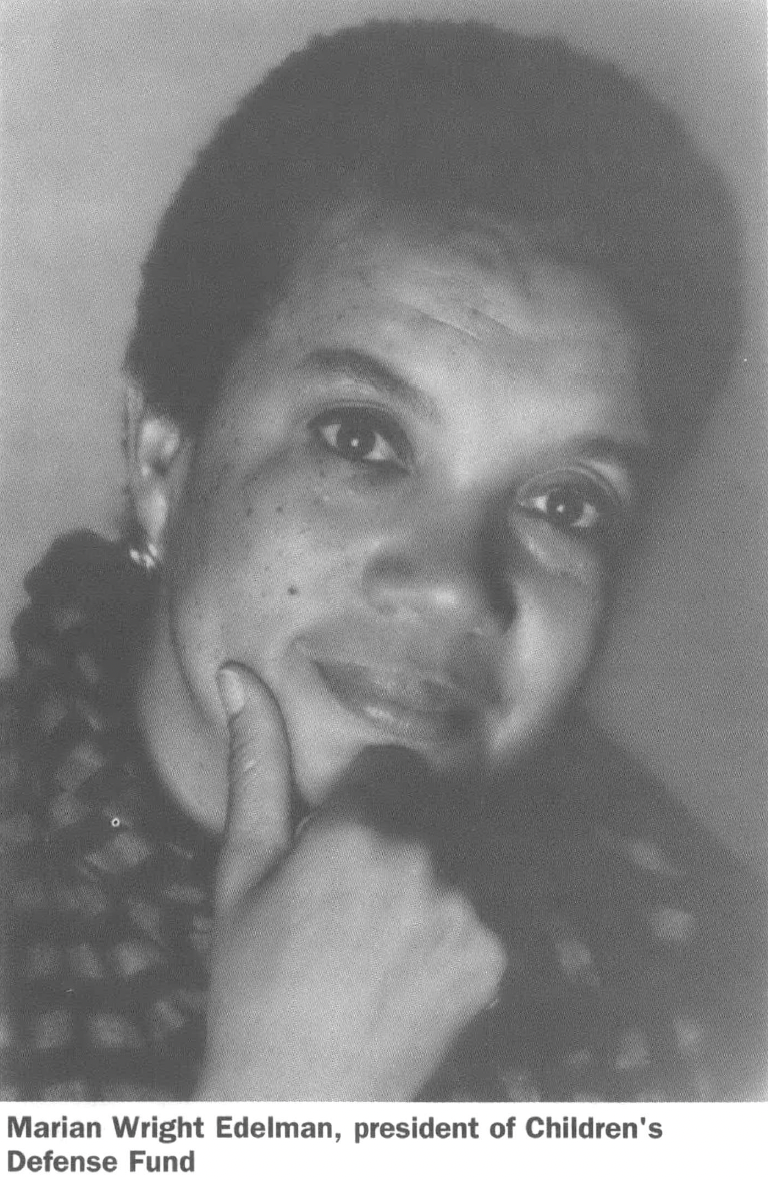
This article originally appeared in Southern Exposure Vol. 23 No. 3 & 4, "Targeting Youth." Find more from that issue here.
Marian Wright Edelman is America’s premier children’s rights activist. She founded the Children’s Defense Fund in 1973 and serves as chairperson. CDF is primarily involved in program and policy development. The organization also lobbies Congress for children’s rights, educates the public about children’s issues, monitors federal agencies, and assists in drafting legislation.
Born in Bennettsville, South Carolina, Edelman attended Spelman College in Atlanta and graduated from Yale Law School. Her new book, Guide My Feet: Prayers and Meditations on Loving and Working for Children, will be available in bookstores this fall. She discussed issues facing America’s children with Southern Exposure in June.
Q: What is the state of youth today? How do you think America’s children have fared under the current administration? Under the Bush and Reagan administrations?
A: CDF’s most recent report, The State Of America’s Children Yearbook 1995, revealed that one in three children growing up today will fall into poverty, drop out of school, or be abused or neglected before reaching adulthood. Child poverty is at its highest level since 1964. Nearly 16 million children are poor. Almost 3 million children were reported abused or neglected in 1993. It’s shameful and it is un-American that millions of children are being left behind when we should be protecting and investing in our children. Regardless of what political party is in the White House or Congress, CDF has always worked hard to impress upon lawmakers and national leaders that investing in children makes economic as well as moral sense.
Q: What effect do you think the Republican “Contract with America” and the Christian Coalition’s “Contract with American Families” will have on the nation’s children, especially the poor?
A: The “Contract with America “ is just a Trojan horse for a relentless policy assault on children’s programs that leaves non-needy constituencies virtually untouched. Not only is it morally wrong, it is economically wrong. Massive child disinvestment creates less healthy, less educated generations of American children who will contribute less to the productivity of the nation. We can and must have deficit reduction and welfare reform that is pro-work and profamily, and greater state and local flexibility, without harming children, harming the economy, undermining work or families, or abandoning our fundamental morality as a society.
Q: What did America gain or lose in the last election? As a result of proposals by the present Congress, do you believe the public at large will finally become outraged over the crisis our children face?
A: I believe Americans who voted for change did not vote to balance the budget on the backs of children. The leaders in Congress want to dismantle guaranteed child protections in the name of balanced budgets. CDF is in favor of balancing the budget, but we are shooting ourselves in the foot by disinvesting in children and cutting programs we know will help children and families thrive.
Q: How do you think the current debate over states’ rights will affect children in the South, which has traditionally ranked low in taking care of children? Do you feel that the block grants to the states will make it easier or harder for local government to get pro-child programs in place?
A: Congress wants to shred and weaken the federal safety net for poor, hungry, disabled, abused, and neglected children with block grants. These fixed-sum block grants tie state hands during economic downturns and do not even require states to maintain their current funding for children.
I would ask Southern governors how they will serve their needy children and families with the next recession. How will they insure that children are better, not worse off? Governor Lawton Chiles of Florida and other governors across the country have very clearly expressed their concern with block grants and states’ ability to serve their residents.
Q: In 1991, the National Commission on Children, on which both you and Bill Clinton served, issued a summary of the problems facing America’s children and made several recommendations for correcting the problems. Have any of these recommendations been implemented by federal or state governments?
A: The recommendations proposed four years ago by the bipartisan National Commission on Children included support for the earned income tax credit, job training programs, health care for pregnant women and children, and food and nutrition programs. In 1993, President Clinton followed through on his pledge to invest significantly in Head Start, immunizations, nutrition programs, and expanded tax credits for the working poor, but Congressional budget cutters have targeted these and many other child welfare programs in their goal to balance the federal budget. Unfortunately they are doing it at the expense of this nation’s future and children’s present.
Q: Where do Head Start, WIC (Women Infants and Children), and health care for children currently stand? Can private groups more efficiently manage these programs than the federal government?
A: Programs like Head Start, WIC, and the federal-state Medicaid health care program have been effectively serving millions of children and pregnant women over the past three decades. Funding for these services has been increased over the years with a goal of serving all eligible children. While no program is perfect and periodically should be reviewed, the private sector is not a substitute for strong federal leadership, which works to ensure quality. And we should review corporate welfare and defense programs for their effectiveness in this post-Cold War era.
Q: In all the talk about balancing the budget and cutting costs, why is it so hard to convince budget-cutting politicians of the benefits of supporting prenatal care, education programs, and other programs to benefit children?
A: Children don’t vote, they don’t lobby, and they don’t make campaign contributions. Their voice and their needs have to rival wealthy interest groups who can afford high-priced lobbyists and [can] contribute to campaigns. Politicians are cutting [programs for]children because they think they can. Every parent, every caring adult has to stand up and say this is unacceptable.
Q: What is the difference between the family values that you feel should be taught youth and the current ones pushed by Republican leaders?
A: Family values are not liberal or conservative, and it’s not the purview of only one party to preach values. I’ve always believed children need the support of their families, religious leaders, educators, and other community leaders. We need to make children a priority and tell them they are valued. We also need to make sure that our public values reflect our private values by holding our elected leaders accountable. Does cutting child care help families work and become self-sufficient? Does cutting school lunches help children learn and achieve? Do the values advocated by politicians leave children better or worse off? Values are what we do for children, not just what we say.
Q: In other interviews, you have spoken of students from historically black colleges and universities working with younger children to help link the generations, but can they reach the present teenagers? How do you convince a 16-year-old, who’s making more money in a month selling crack than his parents do in a year, to believe in your dream of honesty, hard work, and service?
A: You can never assume failure or write off the future of a young person despite the tremendous odds. I have met so many young people who have grown up in hopeless circumstances, but succeeded. It was a caring adult, a family member, or a teacher who reached out and told them they were important and valued and could succeed. It’s never too late to try. Young people will often accept positive alternatives if offered.
I know one young woman who grew up in a tough Washington, D.C., neighborhood where crime, drug use, and violence were daily occurrences. She and her younger brother were raised by their drug-addicted mother, whose habit forced them to move from place to place, eventually forcing them into a shelter. For many years this young girl went to school hungry and poorly clothed. Eventually she went to live with her grandmother, and her life slowly turned around. Today this young woman is president of her high school’s National Honor Society, president of her senior class, and she was recently honored by CDF as a young person who had “beaten the odds.” The lesson here is that you can never write off any child.
Q: What do you think the next five years will bring for our children?
A: I believe America will weather the current political storm threatening our children’s future because the American people will not let the Congressional budget-cutters get away with shredding the safety net for our most vulnerable children. Meanwhile, we all must work together to build a movement for children and to reweave the fabric of community and reinstill the value of family and [of] neighborhoods caring for children. CDF will continue to work to leave no child behind.
Black Men for the Eradication of Sexism
By Christopher Richburg
Last year at Freaknik, the annual Atlanta gathering that draws thousands of college students from historically black colleges and universities, 21-year-old Kevin Ladaris witnessed a young woman being sexually harassed. Ladaris, a junior at Morehouse College in Atlanta, saw a young woman who “got the attention of one guy. That one guy had turned into 20 guys, pawing and groping the young lady. She was very distraught, screaming, crying, and cursing.”
Another witness to such events, Omar Freila, created an organization dedicated to empowering young people and other community members to resist abuse and prevent violence in their relationships, homes, and communities. He formed Black Men for the Eradication of Sexism — BMES after he returned to Morehouse from Freaknik. Today, the group has an active membership of about 20 men.
Ladaris says that he joined BMES to confront his own sexism. “I felt it was important to deal with [sexism] institutionally and personally.”
The group opposes local strip clubs as well as sexist music and pornography. BMES holds bi-weekly discussions on the campus of Morehouse, where the group was chartered. “We educate ourselves as well as other men on campus and the community on how their activities contribute to misogynist behavior. Once we understand personally, then we begin to see that sexism is a symptom of a larger system of oppression towards people,” says Ladaris.
BMES has formed coalitions with other organizations, including the Youth Task Force, the Black Women’s Health Project, and Men Stopping Violence, a counseling group for men who abuse their wives.
In November, BMES will hold a conference, “Feminist/Womanist Men of African Diaspora” to educate men on sexism.
The group also plans to go to local schools to talk to children. Freila says that he would like BMES to set up mentoring programs that deal with the question of masculinity. “We feel that the best way to reach black men is to have the message come from other black men.”
Black Men for the Eradication of Sexism
P.0. Box 11078
Atlanta, GA 30310
(404) 758-8340
Tags
Terri Boykin
Chris Richburg and Terri Boykin attend North Carolina Central University in Durham, North Carolina, and are interns with Southern Exposure. (1995)

